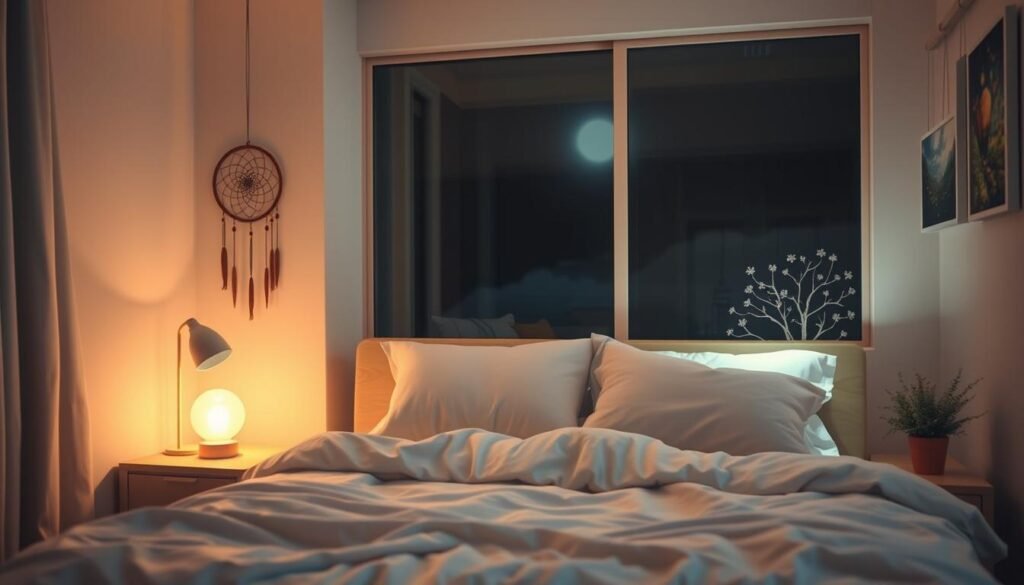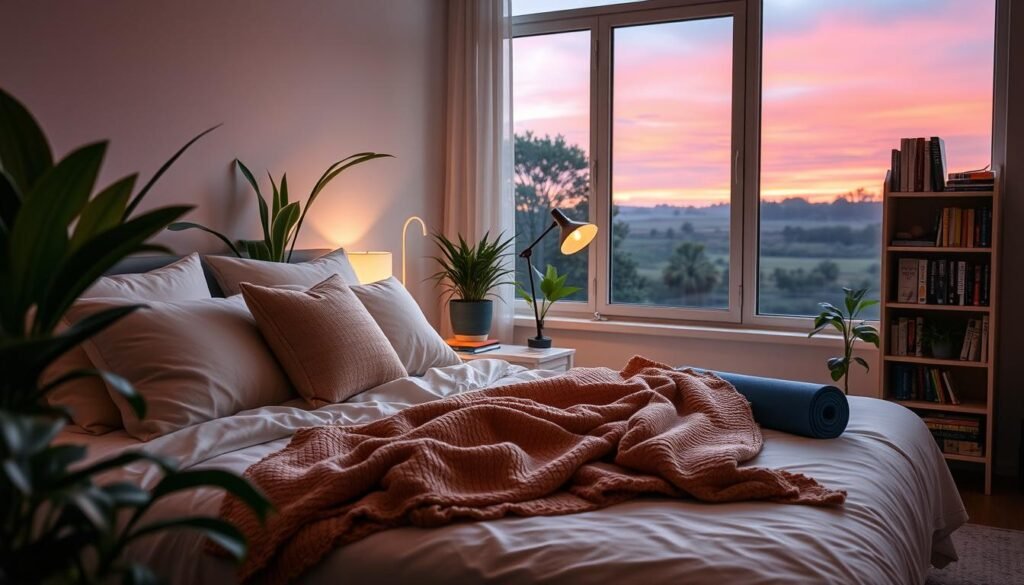Did you know nearly 30% of adults face insomnia symptoms sometime? These sleep issues can deeply affect health, mood, and day-to-day life. Understanding insomnia and finding treatments is key since adults need 7 to 9 hours of sleep nightly.
This article is your guide to better sleep. We will look into insomnia’s causes, symptoms, and treatments. Knowing why you can’t sleep helps in finding ways to improve it. Let’s learn how to stop sleepless nights.
Key Takeaways
- Nearly 30% of adults suffer from insomnia at some point.
- Most adults need 7 to 9 hours of sleep for optimal health.
- Insomnia can lead to serious health issues, including heart disease.
- Understanding the causes of insomnia can assist in finding effective treatments.
- Short-term insomnia often results from stress, while long-term may signal underlying conditions.
- Improving sleep hygiene is essential for better sleep quality.
What is Insomnia?
Insomnia is a common sleep disorder that makes it hard to fall asleep, stay asleep, or causes early waking. Many with insomnia often feel tired during the day. This can affect their energy and mood. The definition of insomnia includes various experiences, from short-term stress-related issues to long-lasting troubles.
About one-third of adults face insomnia symptoms at some time. This makes it the top sleep disorder, says the American Psychiatric Association. Sometimes, the problem is just for one night. But, if it lasts, it may need attention, especially if it disrupts daily activities. Stress, sadness, environmental noise, and poor sleep habits can lead to insomnia.
It’s important to find the right treatment for insomnia. This might mean better sleep routines or trying Cognitive Behavioral Therapy for Insomnia (CBT-I). Such methods can help with long-term insomnia. They also improve sleep quality and overall health.
Common Symptoms of Insomnia
Insomnia shows up with different symptoms of insomnia that greatly affect daily life. Many people feel fatigue during the day. They have trouble staying awake and focused. Waking up often at night or taking a long time to fall asleep are common too.
Some folks may wake up too early and still feel tired and sleepy. This makes starting the day hard.
Other sleep challenges tied to insomnia include:
- Feeling more irritable and mood swings
- Hard time focusing or remembering things
- Constant worry about how well or how much you sleep
Knowing these signs is key to detecting insomnia. Once recognized, people can look for ways to sleep better. Not handling insomnia can lead to bigger health issues like heart disease and diabetes. You can learn more about insomnia’s impact by visiting this resource.
Understanding Insomnia Causes and Treatments
Insomnia is a common problem that affects people of all ages. It disrupts daily activities. Knowing the difference between short-term and long-term insomnia helps find the right treatments. Short-term insomnia, which lasts for under three months, is usually due to stress. Long-term insomnia lasts for over three months and may relate to health problems or lifestyle choices. It’s important to understand these types to treat insomnia effectively.
Short-term vs. Long-term Insomnia
Those with short-term insomnia often see their sleep problems go away quickly. It’s usually linked to changes like a new job or a move. On the other hand, long-term insomnia harms a person’s life. It affects sleep, health, mood, and the ability to focus. Knowing why you can’t sleep is key to finding the right treatment.
Impact of Sleep Deprivation
Sleep loss does more than just make you tired. Not sleeping enough can increase the risk of heart disease and memory issues. It also hurts your social life and work performance. This makes the insomnia cycle worse. Taking steps early on, like improving your sleep habits, is crucial. This helps you sleep better and improves your health.
Major Causes of Insomnia
Understanding what causes insomnia is key to treating it. Stress, bad sleep habits, and health issues are major factors. Each one impacts how well a person sleeps.
Stress and Anxiety
Stress and anxiety are top causes of sleep problems. They make it hard for someone to calm down at night. Nearly half of those with insomnia also face mental health challenges. Worrying too much can lead to poor sleep and tiredness.
Poor Sleep Hygiene
Bad sleep habits are a big problem. They make a good night’s sleep hard to get. But fixing these habits can make a huge difference. Going to bed at the same time each night helps. So does having a peaceful place to sleep.
Medical Conditions and Medications
Health issues can also cause sleep troubles. Chronic pain, heartburn, and sleep apnea are a few examples. In fact, 1 in 5 adults may have sleep apnea. Sometimes, medications interrupt sleep. It’s important to know how these factors are linked to insomnia.

The Role of Sleep Hygiene in Treating Insomnia
Sleep hygiene is key in dealing with insomnia. It improves sleep quality and overall health. Having a good sleep setting and a regular sleep time helps a lot.
Creating a Comfortable Sleep Environment
To make a sleep-friendly place, comfort and peace are important. Here are some tips:
- Temperature: A cool room is best for sleeping well.
- Noise: Using white noise or other sound-blocking methods helps.
- Lighting: Keep bright lights low before bed to get ready for sleep.
- Bedding: Pick a comfy mattress and soft sheets for better rest.
Studies show that good sleep habits can fix many sleep problems. Learn more about its effects on sleep issues.
Establishing a Regular Sleep Schedule
Having the same sleep routine supports your body’s daily rhythm. Here’s what you can do:
- Fixed Wake-Up Time: Wake up at the same time every day for a stable routine.
- Gradual Adjustments: Change your bedtime slowly to adjust better.
- Avoiding Excessive Napping: Don’t nap too much to keep your night sleep on track.
Avoiding caffeine and alcohol before bed also helps with sleep. Discover more tips for a good sleep pattern.
Cognitive Behavioral Therapy for Insomnia
Cognitive Behavioral Therapy for Insomnia (CBT-I) is a top choice for treating long-term sleep problems. It aims to fix the root causes, not just the symptoms. It uses therapy techniques to change negative thoughts and habits about sleep.
People often have six to eight sessions, but some see results after just one. Each meeting lasts 30 to 60 minutes. They learn cognitive restructuring, stimulus control, and sleep restriction. These methods help create better sleep habits.

The success rate of CBT for insomnia is notable. About 70% to 80% of people with primary insomnia get better after doing CBT-I. Sleep restriction and stimulus control are proven to improve sleep quality and reduce wake-ups at night.
CBT-I has benefits that last and doesn’t have the bad side effects of sleeping pills. It teaches people how to tackle sleep problems by understanding thoughts, feelings, and behaviors. This way, they can keep up good sleep after therapy ends.
Yet, not everyone can easily find CBT-I due to few trained specialists. If CBT-I is hard to reach, trying lifestyle changes and relaxation methods is advised. This can help with sleep issues now and improve overall health in the future.
| Aspect | Details |
|---|---|
| Recommended Duration | 6-8 sessions |
| Session Length | 30-60 minutes |
| Common Techniques | Cognitive restructuring, stimulus control, sleep restriction |
| Effectiveness | 70-80% of patients experience improvement |
| Risks of Prescription Medications | Dependence, withdrawal symptoms |
Exploring Melatonin Supplements and Other Herbal Remedies
Many people face sleep problems and look to melatonin supplements and herbal remedies for insomnia. Melatonin is a hormone that helps us sleep and is used to manage sleep issues. Learning about melatonin and other natural aids can help us find better sleep.
Understanding Melatonin’s Role in Sleep
Melatonin signals our body it’s time to sleep. Studies say melatonin can help with delayed sleep phase disorder and insomnia. But, melatonin can make you sleepy, so don’t drive for five hours after taking it.
Melatonin can cause headaches, dizziness, and nausea. Some might have vivid dreams or mood swings. Though safe for short-term use, we need to know more about long-term effects. Always talk to a doctor before starting melatonin, especially if you’re on other meds or have health issues.
Other Natural Supplements
Besides melatonin, other natural sleep aids can improve sleep. For instance:
- Valerian Root: Known for its calming effects, it may help you fall asleep faster.
- Lavender: Its scent is calming. Lavender oil can make you relax and sleep better.
- Chamomile: Drinking chamomile tea can calm you down and help you sleep better.
These herbal remedies for insomnia seem helpful, but be careful. Their safety and how well they work can differ. It’s best to talk to a health pro before trying new supplements.
| Supplement | Potential Benefits | Common Side Effects |
|---|---|---|
| Melatonin | Regulates sleep-wake cycles | Dizziness, nausea, mood changes |
| Valerian Root | Reduces time to fall asleep | Headaches, digestive upset |
| Lavender | Promotes relaxation and improved sleep | Allergic reactions in sensitive individuals |
| Chamomile | Reduces anxiety, improves sleep quality | Allergic reactions, nausea |
Prescription Sleep Aids: What You Need to Know
Prescription sleep aids offer a solution for those struggling with insomnia. It’s crucial to understand their types and risks. Healthcare providers often recommend these sleep medications based on personal health. Remember, considering the side effects of sleep aids is essential for your well-being.
Types of Prescription Medications
There are several types of prescription sleep aids. Each works differently and is used for various reasons:
- Benzodiazepines: Medications like alprazolam (Xanax) and diazepam (Valium) help with short-term insomnia.
- Non-benzodiazepine hypnotics: Zaleplon (Sonata) and Zolpidem (Ambien, Edluar, Zolpimist) have a lower addiction risk.
- Melatonin receptor stimulators: Ramelteon (Rozerem) aims to regulate sleep.
- Antidepressants: Drugs like Amitriptyline and Mirtazapine (Remeron) are used for their calming effects.
- Orexin receptor antagonists: Lemborexant (Dayvigo) supports the sleep-wake cycle.
Potential Risks and Side Effects
Prescription sleep aids can be effective but carry risks. Older adults or those with certain health conditions may face more side effects. Side effects of sleep aids can include:
- Dizziness
- Headache
- Nausea
- Prolonged drowsiness
- Altered thinking and behavior
Misuse or overuse of these medications can lead to dependency and other sleep troubles. It’s crucial to follow safety measures. Use sleeping pills as directed and avoid dangerous interactions with other substances.
Stress Management and Relaxation Techniques
Managing stress is key to sleeping better. Stress elevates cortisol and can cause insomnia. It messes up your sleep and increases anxiety. Relaxation methods can really help with this. Methods like mindfulness, deep breathing, and meditation help calm the body. This helps you sleep better.
Effective Relaxation Techniques
Many techniques can reduce stress and improve sleep, such as:
- Autogenic relaxation
- Progressive muscle relaxation
- Visualization
- Deep breathing
- Yoga and tai chi
- Biofeedback
- Music and art therapy
- Aromatherapy and hydrotherapy
It’s important to practice these regularly. Being aware of stress signals lets you use these methods effectively. Mixing these techniques with positive strategies like humor and good time management helps a lot. Overall, it leads to better well-being and stress management.
Importance of Physical Activity
Exercise is great for improving sleep. It reduces stress and leads to deeper sleep. It relaxes your muscles and helps you feel calmer. This makes it easier to fall asleep. Plus, exercise is good for your heart, digestion, and hormone balance. This is especially helpful for those with insomnia. Making exercise a habit improves your sleep and overall health.
For more on stress management and relaxation, consider mindfulness or yoga classes. They are great for dealing with stress-related insomnia.
| Relaxation Technique | Benefits |
|---|---|
| Deep Breathing | Helps reduce anxiety and promotes calmness |
| Yoga | Enhances flexibility and relaxation |
| Massage | Reduces muscle tension and promotes relaxation |
| Meditation | Improves focus and reduces stress levels |
| Progressive Muscle Relaxation | Relieves tension and enhances sleep quality |
Adopting a Healthy Lifestyle to Improve Sleep
Changing your lifestyle can make sleep better. A healthy way of living includes eating right and limiting stimulants like coffee. By choosing certain foods and watching stimulant use, you can sleep better.
Diet and Nutrition Tips for Better Sleep
Eating well helps you sleep better. Here’s how to eat for good sleep:
- Eat light meals at night. This helps avoid discomfort when sleeping.
- Try foods that help you relax, like whole grains, nuts, and dairy. These foods have relaxing nutrients.
- Drink lots of water all day, but drink less before bed. This prevents waking up at night to go to the bathroom.
- Avoid heavy and spicy foods. They can upset your stomach and disturb your sleep.
The Importance of Limiting Stimulants
Cutting down on caffeine and alcohol helps sleep. Here’s why avoiding these is key:
- Don’t drink caffeine in the afternoon or evening. It keeps you awake.
- Drink less alcohol. It might seem to help at first, but it ruins sleep later on.
- Watch your nicotine use. It’s a stimulant that can keep you up.
Mixing a good diet with less stimulant use leads to better sleep. Living healthy is good for sleep and overall health.

When to Seek Professional Help for Insomnia
People who have trouble sleeping regularly should think about getting professional help for insomnia. If you often find your sleep disturbed, feel tired all the time, or notice changes in your mood or thinking, it’s time to seek help. These signs could mean you have a sleep disorder that needs an expert’s opinion.
Seeing a doctor is a crucial move to tackle these problems. Your doctor can do a physical check-up and look at your sleep routines. This full check helps them see the big picture. Sometimes, they might suggest a sleep study to dive deeper into the issue. Figuring out the exact problem is essential to find the right treatment.
Cognitive Behavioral Therapy (CBT) works well for insomnia and is usually the first thing doctors suggest. CBT uses strategies like controlling what triggers your sleeplessness, relaxing techniques, and limiting sleep. Trying these methods might help before moving on to medicines.
If changing habits doesn’t help, then sleeping pills may be an option. Your doctor might talk about medicines like Eszopiclone, Ramelteon, or Zaleplon. It’s important to know the possible side effects, like feeling sleepy during the day or getting hooked, before starting these meds.
Lasting insomnia can lead to serious health problems, such as anxiety and heart disease. Getting the right help doesn’t just improve sleep. It also boosts your overall health. Everyone deserves to understand their symptoms and get care that leads to better sleep and a healthier life.
Conclusion
About 30% of adults have trouble sleeping, struggling to fall asleep or stay asleep. It’s important, though, to remember we can find effective treatments. Cognitive-behavioral therapy, lifestyle changes, and melatonin are all good approaches to improve sleep.
Insomnia impacts more than just sleep quality. It can lead to problems during the day, more accidents, and can even link to depression. Promoting good sleep habits and getting help when needed can help lessen insomnia’s effects.
Taking steps to prevent insomnia and looking at treatment choices helps people get back good sleep. Experts recommend at least 7 hours of sleep for our health. Understanding and dealing with insomnia’s causes is key to a better life.